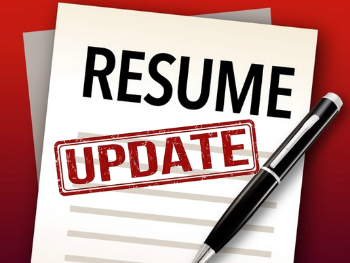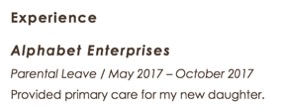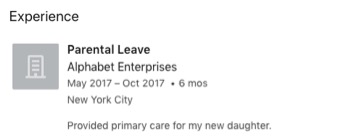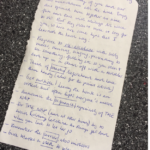
Congratulations! You’ve made the amazing decision to take parental leave. Now, it’s time to celebrate that decision and share it with the world!
Why? Two reasons. The first is to alert other men that it is possible. Most men have not really given parental leave serious consideration, because they don’t know anyone who has done it. By sharing your decision, you’re setting an example for other new and aspiring fathers to follow.

“If John from marketing can do it, maybe I can too..”
Helping build the confidence of others is undoubtedly the most important way you can contribute to this community.
The second reason is to help educate employers, recruiters and anyone else who might see your resume online or in print. There are so few men who actually advertise their decision to take parental leave, so men and women in the working world continue to think of it as unusual at best, and perhaps even career limiting at worst.
Show all of these skeptics that successful “career men” like you are taking parental leave and are thriving, at home and and at work. You’ll be an important contribution to the broader movement to change outdated workplace attitudes, mindset and culture.
So are you ready?
Let’s talk about how to actually do it!
We know it can be hard to find the right words to describe your leave.
Whether online or in print, resumes are traditionally structured to showcase work experience, and periods of leave rarely fit into a professional narrative. Here are our three suggestions for how to add this to your resume.
1) Simple Is Best
In your “experience” or “employment history” section, you likely list out each of your employers, and then describe your job and responsibilities. It probably looks something like this:

There are couple options we think work here. If your employer was supportive and provided you financial compensation and/or job protection during your period of leave, there is a simple solution. All you need to do is create a new section, list your employer and then state your job title as “Parental Leave” or “Primary Caregiver”. Add the duration of your leave and a short description and you’ll end up with something that looks like this:
Print Resume


2) Come “Work” For Us:
For many working professionals, it’s not always as easy to win support from your employer for parental leave. If that’s your situation – or if you would prefer not to link your employer to your parental leave for another reason – we suggest you come “work” for us.
We encourage our community to list our organization, The Greatest Privilege” as your employer during your period of leave. When a potential new employer reads your resume and searches for us, the material on our website will provide valuable information about the decision your made to take leave. In that way, we’re happy to be an advocate for you!
Print Resume


3) Less is More
As you can see from our examples above, we recommend a simple description of your parental leave. The alternate approach – encouraged by many influential career-support organizations and blogs – is to position your parenting skills and related experiences (such as volunteering/community involvement) as relevant to the workplace.
So why do we discourage it? Firstly, and most importantly, we believe that you should not have to “commodify” the time, effort and love you invest in your child(ren). Sure, simultaneously soothing your crying child and cooking dinner while somehow also artfully avoiding the minefield of toys strewn across your kitchen floor is a masterclass in multitasking. Would that be a useful skill for an employer? Sure. But, is that why you did it? Of course not. You did it because that is what parenthood requires. And, we feel that you shouldn’t have to justify your experiences.
Secondly, let’s think this through practically. Generally speaking, employers today are not particularly open-minded about the demands of fatherhood and how they translate into practical skills in the workforce. What a recruiter or human resources officer thinks about when they see the skill of “multi-tasking” or “crisis management” is going to be quite different from the experiences and examples you will be able to provide from your time on parental leave. Is that a bad thing? Not necessarily? We are with you 100% that employers should be changing their mindsets. But, realistically, it’s likely you’ll find yourself struggling to explain your parenting skills to a skeptical hiring manager. At best, they’ll have a family of their own and will be empathetic. At worst, you’ll be perceived as stretching or fabricating relevant experience.
That said, we’d love to hear and read examples of how you’ve added parental leave to your own resume (digital or print). Please let us know in the comments below, and help inspire other readers to do the same!




